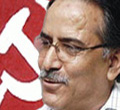
The political crisis in Nepal after the sacking of Army Chief Rukumangad Katuwal by the Prime Minister Pushpa Kamal Dahal alias Prachanda on Sunday has been deepened as the former has refused to step down resulting in a face off between the army and the government. The political parties stand divided on the issue.
Meanwhile, President Ram Baran Yadav intervening the dispute has called the sacking as unconstitutional and asked the Army Chief to continue on his post. The Nepalese President, who is believed to have expressed disapproval to sacking of Katuwal as the due procedure was not followed, has also asked Prachanda to follow constitutional provisions and seek consensus among the parties.
The uncertainty continues as the prime minister, who is reportedly adamant to continue with his decision, has met Attorney General Raghab Lal Vaidhya and the Law Secretary to seek their suggestion this morning. Information and Broadcasting Minister Krishna Bahadur Mahara has said the government has sole right to sack the Army Chief. And the Unified CPN (Maoist) has decided to move Supreme Court against President who, according to them, has disobeyed the civilian supremacy by directing the Army Chief to continue in his office. Katuwal himself has held a meeting with high-level army officials against the Prime Minister’s order.
Expressing disapproval over the Prachanda’s decision, the main alliance of the government, the Communist Party of Nepal (Unified Marxist Leninist) CPN (UML) has withdrawn support to the government and recalled its ministers. This has reduced the Maoists dominated government to minority.
Announcing the decision of Katuwal’s sacking, I&B minister Mahara said Katuwal was fired after he defied government orders not to hire new recruits and failed to give satisfactory answers to three questions asked by the government.
Genesis of Nepal crisis
In the genesis of this crisis exists the disagreement between the government and army over the recruiting of former Maoist rebels in the army. The former is in favour of the integrating guerilla into the army while the latter is strongly opposed to it.
For the last couple of months the issue has been the bone of contention between the two — government and army. The issue even reached to the Supreme Court which prohibited the defence ministry’s order of retiring eight Brigadier Generals of the army.
The decade-long bloody struggle between army and Maoists ended in 2006 following a peace accord signed between Government of Nepal and Maoists.
|
|


Comments: